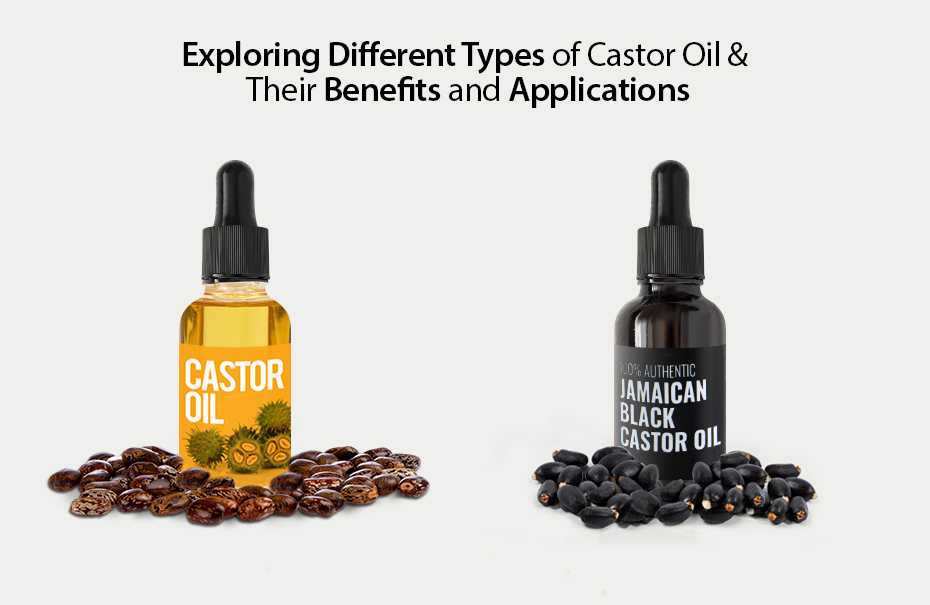Exploring Different Types of Castor Oil & Their Benefits and Applications

Did you know Castor, the oil you grew up hearing a lot, is today a buzzword and one of the most-sought ingredients by almost all industry sectors? But, there’s not just the one regular castor oil that is used everywhere, it has its variants and each differs slightly in benefits and majorly in applications. So, let’s learn more about it.
Castor Oil and its Variants
One of the commonest ingredients in home remedies, castor oil is valued more as a medicinal oil than just any other oil because of its impressive healing properties. Loaded with 85-90% of Ricinoleic acid – a unique monounsaturated fatty acid with a hydroxyl group (-OH) attached to the 12th carbon position, making it responsible for many of the oil’s beneficial properties, castor oil is becoming the favorite raw material for industries more than homes. Why? Because Castor has an amazing bunch of its types that help yield a wide range of products from soap, lubricants, coatings, pharmaceuticals, lotions, and shampoos, to what not?
While the regular yellow castor oil is one that we all have in kitchen storage or are even used today as a part of natural remedy, there are a few castor oil variants that are in huge demand in industries like cosmetics, personal care products, agriculture, pharmaceutical, etc. Check out a list of castor oil varieties below.
Castor Oil Varieties
Although Yellow Castor Oil and Jamaican Black Castor Oil (JBCO) are the two major variants of castor oil, there are a few like:
Sulfated Turkey Red Castor Oil –
Also known as Turkey Red castor oil, this castor oil variant is used in soap and lotion making, blending of lotions, salves, creams, shampoos, and more. It completely disperses in water and doesn’t leave an oily ring around the tub when emulsifying colors, fragrances, and essential oils. It acts as a natural emollient and moisturizer and hence is often added to bath products, natural soaps, and lotions. It is recommended to keep away from the eyes when using.
PEG 40 Hydrogenated Castor Oil –
Hydrogenated castor oil is used in industries such as cosmetics, perfumes, etc., as a fragrance builder and solubilizer in formulations. Being a multifunctional non-ionic surfactant and emulsifier, it helps solubilize fragrances and oils in water-based blends like shampoos and body washes. It is miscible in both oils and water and can be used in various personal care products.
Black Castor Oil (Jamaican Black Castor Oil) –
Known to be a magic oil for hair, black castor oil is extracted and cold-pressed from roasted seeds of the castor plant. JBCO has almost similar benefits to regular castor oil, it only differs due to its roasting process, which results in a dark appearance and roasted nutty fragrance of it. JBCO is extremely useful in enriching skin and hair care products and is believed to improve hair growth and moisturize hair with its regular application.
Cold-Pressed Castor Oil –
Instead of heating, when castor oil is extracted from castor beans using pressure, cold-pressed castor oil is obtained that is rich in its essential nutrients and properties which are a bit less in hot-pressed castor oil. Cold-pressed castor oil is widely used for hair and skin care due to its purity and high-quality composition.
Organic Castor Oil –
It is derived from organically grown castor beans without the use of pesticides or chemicals and hence is a preferred choice for those seeking a more natural and environmentally friendly option.
Pharmaceutical Grade Castor Oil –
When castor oil is extracted for medicinal usage, it is highly refined to remove impurities and hence a pharmaceutical grade castor oil is often used as a laxative to relieve constipation. Unlike regular castor oil, it undergoes a stringent purification process to ensure it meets the required quality standards for pharmaceutical and medical applications.
Low-moisture Castor Oil –
The term low-moisture castor oil refers to castor oil that contains a specific amount of moisture that is lower than the amount present in regular yellow castor oil. It is ideal for certain applications that require lower moisture content and hence undergo specialized processing to reduce its water content.
Applications and Benefits of Castor Oil
Hair Growth:
Castor oil is popular for its amazing benefits on hair. It has everything that enhances hair growth. Regular application of castor oil can nourish hair follicles, stimulate blood circulation in the scalp, and strengthen hair strands, resulting in thicker and healthier locks.
Skin Care:
Castor oil is a natural moisturizer and even helps in reducing inflammation which is why it is highly present in almost all skin care products. Apart from soothing dry, irritated skin, reducing acne, and even fading scars and stretch marks, it is believed to even help prevent future breakouts.
Eyelashes and Eyebrows:
In earlier times when there was no mascara, castor oil was used on eyelashes and eyebrows not just to make them appear bigger but also to stimulate growth, making them thicker and longer. It also helps in preventing lash and brow breakage.
Constipation Relief:
Pharmaceutical-grade castor oil can act as a gentle and effective laxative when taken internally. It lubricates the intestines, promoting bowel movements, and providing relief from occasional constipation.
Pain Relief:
Castor oil packs are external applications used to relieve pain and inflammation in specific areas. They are particularly useful for joint and muscle pain, menstrual cramps, and other inflammatory conditions.
Tips for Choosing and Using Castor Oil
Castor oil may be natural but not necessarily it will be suitable for all. Hence, if using on skin and hair, perform a patch test before using castor oil to check for any adverse reactions. Start with a small amount and gradually increase if needed. Avoid getting castor oil into the eyes.
For enhanced benefits, mix castor oil with carrier oils, essential oils, or herbal extracts. However, always do a compatibility test before blending different oils together.
Also, buy from a reliable source rather than falling for cheap ones. The chances of adulteration are high in buying from any random source. Research well and choose the castor oil as per your needs.
Castor oil may take time to show noticeable results. One has to be patient and use it regularly to see surprising results.
Castor oil is indeed used for medicinal purposes but, one must not take it orally on their own as it may cause adverse effects. Therefore, it is advisable to consult a physician before experimenting anything with it. Children under 6 years of age and pregnant women should stay away from castor oil as it has laxative properties and consumption of it without medical advice can trigger contractions in pregnancy, leading to complications.
It’s best to consult with a healthcare professional before using any natural remedies, including castor oil, during pregnancy, for young children, or for any other reason because safety is always a priority when it comes to healthcare.
Conclusion
By exploring the different types of castor oil and understanding their benefits and applications, you can unlock the true potential of this natural wonder and incorporate it effectively into your beauty and wellness routine. Remember to choose the right type of castor oil for your specific needs and practice safe usage for optimal results.



